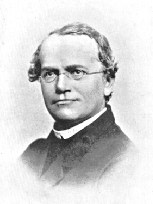Gregor Mendel
|
|
Gregor Johann Mendel (July 22, 1822 – January 6, 1884) was a Czech-Austrian monk who is often called the "father of genetics" for his study of the inheritance of traits in pea plants. Mendel showed that there was particulate inheritance of traits according to his laws of inheritance. However, Mendel's work was largely ignored until the turn of the 20th century, when its significance was understood for the first time.
| Contents |
Life
Gregor-Johann-Mendel-memorial-plaque.jpg
Mendel was born in into a German speaking family in Heinzendorf, Moravia, Austrian Empire (now Czech Republic). During his childhood Mendel worked as a gardener, and as a young man attended the Philosophical Institute in Olomouc. In 1843 he entered an Augustinian monastery in Brno. He was later sent to the University of Vienna to study.
Gregor Mendel was inspired by both his professors at University and his colleagues at the monastery to study variation in plants. He commenced his study in his monastery's experimental garden. Between 1856 and 1863 Mendel cultivated and tested some 28,000 pea plants. His experiments brought forth two generalizations which later became known as Mendel's Laws of Inheritance.
Mendel's attraction to research was based on his love of nature. He was not only interested in plants, but also in meteorology and theories of evolution. Mendel often wondered how plants obtained atypical characteristics. On one of his frequent walks around the monastery, he found an atypical variety of an ornamental plant. He took it and planted it next to the typical variety. He grew their progeny side by side to see if there would be any approximation of the traits passed on to the next generation. This experiment was "designed to support or to illustrate Lamarck's views concerning the influence of environment upon plants." He found that the plants' respective offspring retained the essential traits of the parents, and therefore were not influenced by the environment. This simple test gave birth to the idea of heredity.
Mendel read his paper, Experiments on Plant Hybridization, at two meetings of the Natural History Society of Brunn in Bohemia in 1865. When Mendel's paper was published in 1866 in Proceedings of the Natural History Society of Brunn, it had little impact, and was cited about three times over the next thirty-five years.
Mendel died on January 6, 1884 in Brno, Austria-Hungary (now Czech Republic), from chronic nephritis.
Rediscovery of Mendel's work
It was not until the early 20th century that the importance of his ideas was realized. In 1900, his work was finally rediscovered by Hugo de Vries, Carl Correns and Erich von Tschermak. His results were quickly replicated, and genetic linkage quickly worked out. However, a period of tense argument ensued over its significance between William Bateson and Karl Pearson. Ronald Fisher in 1918 used Mendelian genetics as the basis of the start of the modern synthesis in evolutionary biology.
His experimental results have later been the object of considerable dispute. The renowned statistician Ronald Fisher analyzed the results of the F1 (first filial) ratio and found them to be implausibly close to the exact ratio of 3 to 1. Only a few would accuse Mendel of scientific malpractice or call it a scientific fraud — reproduction of his experiments has demonstrated the accuracy of his hypothesis — however, the results have continued to be a mystery for many, and he is generally suspected of having "smoothed" his data to some degree (not knowing about the importance of blind classification). The fact that his reported results concentrate on the few traits in peas which are determined by a single gene has also suggested that he may have censored his results, otherwise he would have stumbled across genetic linkage.
The standard botanical author abbreviation Mendel is applied to species he described.
Mendel and Darwin
Mendel lived around the same time as the British naturalist Charles Darwin (1809 — 1882), and many have fantasized about a historical evolutionary synthesis of Darwinian natural selection and Mendelian genetics during their lifetimes. Mendel had read a German translation of Darwin's Origin (as evidenced by his notes in the margin of the copy in his monastery), but apparently failed to realize its significance. Darwin received a copy of Mendel's paper, but he did not read it (as evidenced by the pages of the paper remaining uncut). In the event, the modern evolutionary synthesis did not start until the 1920s, by which time statistics had become advanced enough to cope.
Bibliography
- Colin Tudge In Mendel's footnotes ISBN 0099288753 book about Gregor Mendel
- Curt Stern and Sherwood ER (1966) The Origin of Genetics.
- Robin Marantz Henig, Monk in the Garden: The Lost and Found Genius of Gregor Mendel, the Father of Genetics, Houghton Mifflin, May, 2000, hardcover, 292 pages, ISBN 0395977657; trade paperback, Houghton Mifflin, May, 2001, ISBN 0618127410
- William Bateson Mendel's Principles of Heredity, a Defense, First Edition, London: Cambridge University Press, 1902. On-line Facsimile Edition: Electronic Scholarly Publishing, Prepared by Robert Robbins (http://www.esp.org/books/bateson/mendel/facsimile/title3.html)
- Reginald Punnett, Mendelism, Cambridge, 1905
- Robert Lock, Recent Progress in the Study of Variation, Heredity and Evolution, London, 1906
- James Walsh, Catholic Churchmen in Science, Philadelphia: Dolphin Press, 1906

